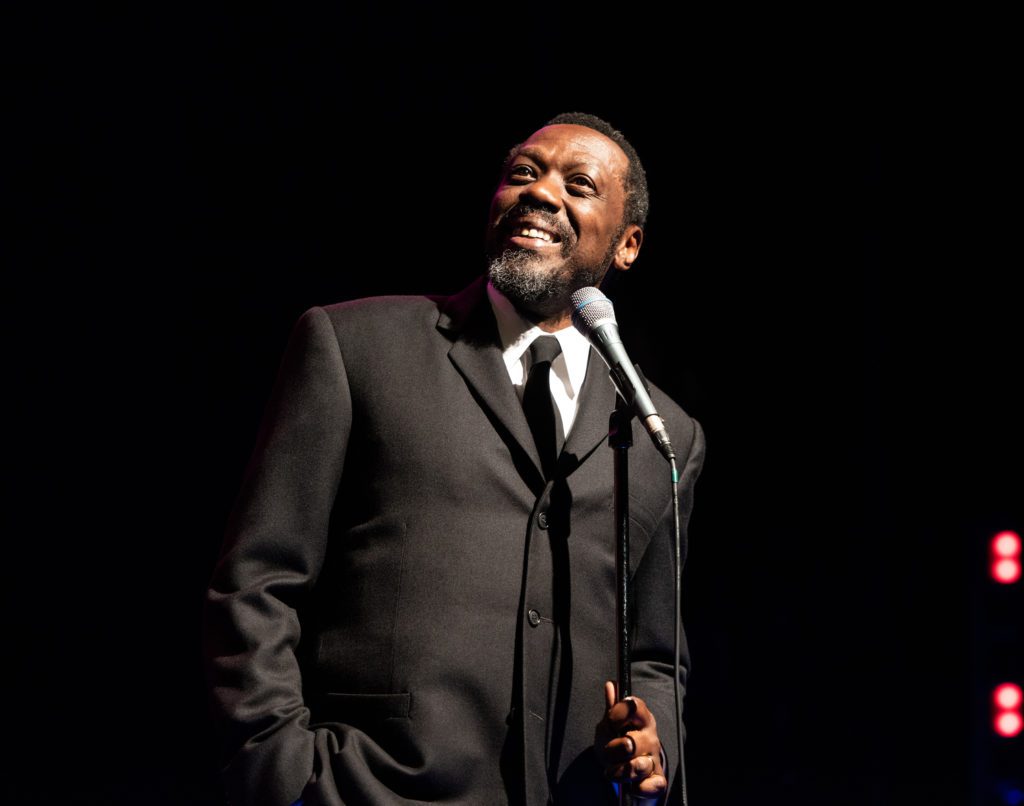Playing Dick Gregory at Arena Stage
By • September 26, 2018 0 1133

Audiences interested in finding out what it took — the sacrifices, the punishing obstinance, the imagination, the courage — to achieve not just diversity of a sort in America, but opportunity, the simple, powerful embrace of civil rights, will want to check out “Turn Me Loose,” the edgy drama about Dick Gregory, portrayed by Edwin Lee Gibson. The show is at Arena Stage through Oct. 21.
Gregory was, in the theatrical, historical and political sense, as well as in the flesh, a man of many parts, enough to fill a category sheet that runs like an homage and a resoundingly interesting resume: actor, performer, activist and agitator for many causes, especially —pretty much from his first breath — social justice and civil rights.
And, oh yes, he was a stand-up comic, a man of humor, jest and jokes, of the funny kind, but also of the revolutionary kind.
He spent a good part of his later life in Washington, D.C., a familiar figure at gatherings, meetings, convocations and protests. He died last August, becoming in the end a man who had the air of sage and prophet about him, a man who long ago proved his courage and was sustained by it, a man who by getting us to laugh made us think.
Georgetown and Georgetowner author Shelia Moses helped write his book, “Callus on MySoul: A Memoir,” published in 2000.
Gregory looms large in Gibson’s mind. “I look at him, and his life, and I see a man who was becoming all of the time, evolving. He wasn’t standing still. And, you know, that’s what you aspire to, becoming a man, the best one you can be.”
Gibson is a man of the theater. That’s where he’s spent most of his professional life — some of it in auspicious places with auspicious work and auspicious peers. In fact, when he was offered the part of Gregory, he had just finished a nine-month gig in London and Paris working with legendary director Peter Brook.
“I learned about the play from casting director Jack Doulin,” he said. “It’s in New York withJoe Morton, but they were doing this production, and I was told, ‘You got it if you want it.’”
Gibson wanted it. He had done some television, the always reliable “Law and Order” series, but his life was in plays, one way or another. He’s written six plays himself and performed in close to 100, beginning as a teen in the Ross S. Sterling High School drama club in Houston, where he was raised.
He also did sketch comedy and stand-up stints, reflecting an earlier renaissance bent, playing baseball and studying mathematics at Paul Quinn College. And he was a company member of Houston’s prestigious Ensemble Theatre.
When we talked on the telephone, he was just getting acclimated to the city — a first for him — and the play and project. “I’m not quite sure I fully realized what I was getting into here. It’s such a challenge. You have to do honor and embody a man who was complicated, who changed over time while remaining the same, who had charisma and strong, fearless principles. He paved the way.”
Gregory was famous for getting his start and breaking through barriers by playing nightclubs and getting on the late-night talk shows — all predominately white venues, where he often had to deal with persistent white hecklers, as was famously the case atHugh Hefner’s Playboy Club in Chicago. His humor was always to a degree about being black in white America, and what that meant as it changed over the years.
“First and foremost, he insisted you had to be funny as a performer. That’s what he
did,” said Gibson, who is 53, more than 30 years younger than Gregory. “But he never let you forget who he was.”
What Gregory was, was a giant figure in history, and a very funny man. He was a forerunner of political comedians like Mort Sahl and even more so Lenny Bruce, but most essentially Bill Cosby and Richard Pryor. “They were different, but he made them possible as performers,” said Gibson.
While he did stand-up comedy himself, Gibson is used to the thickness of formulating and creating characters on stage, from Iago to Ralph in “The Mother—— With the Hat,” a roleplayed by Chris Rock on Broadway.
It’s plain that he wants to do Gregory justice. “I don’t want to mimic him, to do an exact portrait. I want to get the sense and essence of him. Sure, voice and sound and mannerism are important, but it’s not just how somebody says something or moves. It’s who he was and still is that’s important.
“You know, audiences are essential to this. It depends on who’s here on any given day or time. Sometimes, you know, there’s this thoughtful silence out there, when you thinkthey’re hearing every word, and other times there’s a restlessness. And you’ve got to figurethat out and communicate.
“It’s a challenge, but I love doing it, and him and being here. I understand they called it Chocolate City and it looks like it still is.”
He’s not alone onstage — there’s actor John Carlin taking on various parts, including a heckler — but Gibson as Gregory is the focus. “Sometimes, we think people ought to like us or the character. But that’s not so. You’re not entitled. You got to earn what you get.”
Dick Gregory earned it with laughs and jokes and biting humor and beatings at marches. Gibson earns it with the artistry of truth.

